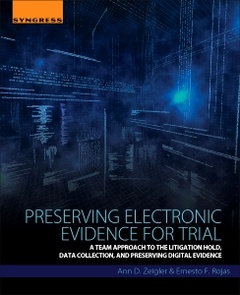Description
Preserving Electronic Evidence for Trial
A Team Approach to the Litigation Hold, Data Collection, and Evidence Preservation
Authors: Rojas Ernesto F., Zeigler Ann D.
Language: English
Subjects for Preserving Electronic Evidence for Trial:
60.64 €
In Print (Delivery period: 14 days).
Add to cartSupport: Print on demand
Description
/li>Contents
/li>Biography
/li>Comment
/li>
The ability to preserve electronic evidence is critical to presenting a solid case for civil litigation, as well as in criminal and regulatory investigations. Preserving Electronic Evidence for Trial provides everyone connected with digital forensics investigation and litigation with a clear and practical hands-on guide to the best practices in preserving electronic evidence.
Corporate management personnel (legal & IT) and outside counsel need reliable processes for the litigation hold ? identifying, locating, and preserving electronic evidence. Preserving Electronic Evidence for Trial provides the road map, showing you how to organize the digital evidence team before the crisis, not in the middle of litigation. This practice handbook by an internationally known digital forensics expert and an experienced litigator focuses on what corporate and litigation counsel as well as IT managers and forensic consultants need to know to communicate effectively about electronic evidence.
You will find tips on how all your team members can get up to speed on each other?s areas of specialization before a crisis arises. The result is a plan to effectively identify and pre-train the critical electronic-evidence team members. You will be ready to lead the team to success when a triggering event indicates that litigation is likely, by knowing what to ask in coordinating effectively with litigation counsel and forensic consultants throughout the litigation progress. Your team can also be ready for action in various business strategies, such as merger evaluation and non-litigation conflict resolution.
Introduction
Chapter 1: Your Critical Task: Learn Another Language
Chapter 2: Preserving, Not Corrupting—HOLD IT!
Chapter 3: Incident Response, While Avoiding Evidence Disaster: The Team
Chapter 4: Understanding Information Systems
Chapter 5: In Addition to the System—Other Devices
Chapter 6: Collecting Data
Chapter 7: Teamwork Prep for Data Management
Chapter 8: Data Policies and Procedures—Get the Details
Chapter 9: The Cloud and Other Complexities
Chapter 10: Putting It All Together: When the First Alarm Sounds, Hold It!
Chapter 11: The Rule 26 Meet-and-Confer—Your Best Chance to Control the ESI Exchange
Chapter 12: A Glance at International Issues—Never Assume!
Conclusion
Resource Appendix
He was a member of the Scientific Working Group on Digital Evidence and of the American Academy of Forensic Sciences. He received numerous certifications and recognition awards. He also served as an advisor to the Dean of the School of Computer Science and Engineering of the University of Houston Clear Lake on curriculum and education matters. Mr. Rojas passed away in late 2014.
Ms. Zeigler has been a practicing attorney since 1984, and is an experienced federal litigator. For many years, she represented Chapter 7 bankruptcy trustees in complex cases involving asset concealment and evidence destruction. She is also an award-winning writer and speaker on law-related topics, and is a former editor of The Houston Lawyer magazine. She has been in Marquis Who’s Who in American Law since 1993 and in Who’s Who in America since 2001.
Ms. Zeigler was a citizen volunteer with the Houston Police Department, supporting investigations at the Juvenile Sex Crimes Unit from 2008 until 2013. She is a graduate of the HPD and FBI (Houston) Citizens’ Academies.
- Destroy your electronic evidence, destroy your own case—learn how to avoid falling off this cliff
- Learn how to organize the digital evidence team before the crisis, not in the middle of litigation
- Learn effective communication among forensics consultants, litigators and corporate counsel and management for pre-litigation process planning
- Learn the critical forensics steps your corporate client must take in preserving electronic evidence when they suspect litigation is coming, and why cheerful neglect is not an option



